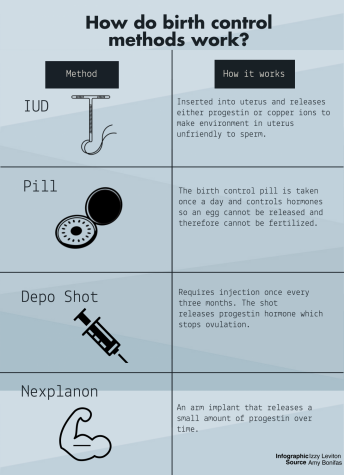Health professionals explain science behind birth control methods
Teacher, doctor emphasize importance of contraception education
Senior SHEC president Philip Djerf leads a discussion on sexual education topics, including contraception.
November 21, 2017
According to health teacher Amy Pieper-Berchum, she believes it is important that Park teaches about birth control so students can make informed decisions when it comes to sexual activity.
“I think the knowledge is extremely important because we have a comprehensive sexual health education program here,” Pieper-Berchum said. “It is not abstinence only, but we encourage people to make sure they are ready to partake in sexual activity.”
Senior Sexual Health Education Club (SHEC) president Izzi Gilbert Burke said it is good for students to know how birth control methods affect the body to prevent pregnancies.
“I do believe it is important to know how it works because it can inform you even more on how to proceed in some situations, and it is good to know what’s happening in your body,” Gilbert Burke said.
Pieper-Berchum said she believes it is beneficial for students to learn about different birth control methods and then to teach their peers to encourage an open dialogue.
“When I started teaching the birth control unit with Ms. Luskey to see the comfort level of the kids when they come up and present their method, the comfort level and the ability for those kids to be able to teach and talk about these methods in front of their peers I think is invaluable,” Pieper-Berchum said. “I think it is good practice to talk about that during class and see how people talk about that and communication practice about those topics.”
According to Park Nicollet doctor Amy Bonifas, certain types of birth control are more popular than others.
“People using the pill, using depo, IUDs and condoms are probably the most common,” Bonifas said.
Peiper-Berchum said there are two types of IUDs and they both work by making the environment in the uterus unfriendly for sperm so it cannot fertilize the egg.
“With the IUD, there are two main types. You can have hormone releasing and basically what it does is it has progestin released and it makes the environment (in the uterus) unwelcoming. It thickens the mucus and it makes the sperm and egg almost impossible to find each other,” Pieper-Berchum said. “The copper kind is less common but it lasts longer. Some people say 10-12 years. It releases the copper ions and they inhibit the sperm and the egg’s ability to implant in the uterine wall.”
Bonifas said the birth control pill works by controlling your hormones, so an egg is not able to be fertilized.
“The pills works by bossing your hormones around. At least in the most common type of pill, you don’t release an egg reliably every month, and if you don’t release an egg, you can’t have it fertilized, so you can’t get pregnant, which is the primary way it works,” Bonifas said.
Gilbert Burke said although the health curriculum teaches about birth control options, it is also important for students to know birth control works in your body and the science behind it.
“I don’t think most people really understand how birth control works. They know generally, but I think people would rethink some decisions if they knew how it worked scientifically,” Gilbert Burke said.
According to Bonifas, other birth control methods like the depo shot and Nexplanon release progetrin into the body over a certain amount of time to prevent pregnancy.
“The rod in the arm (Nexplanon) is a little, four centimeter, plastic device that produces a small continuous amount of hormone. That changes your cervical mucus and also decreases ovulation and prevents pregnancy that way,” Bonifas said. “Depo is similar is that it releases a progestin hormone, a hormone to inhibit ovulation. It is good for three months.”





